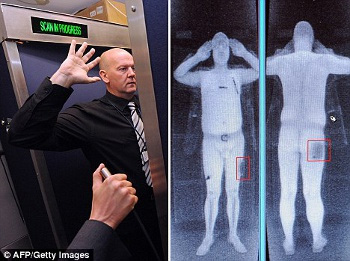
|  |  |  Travel & Outdoors Travel & Outdoors  
Senate Bill Would Make Airport Body Scanners Mandatory
 Daniel Tencer - the raw story Daniel Tencer - the raw story
go to original
July 12, 2010


| | An airport staff member demonstrates a full body scan at Manchester Airport. (AFP/Getty) |  |
A bipartisan bill introduced in the Senate requiring all airports to use full-body scanners lacks sufficient privacy safeguards, says a prominent watchdog group.

The Electronic Privacy Information Center says the bill, introduced in the Senate by Sen. Bob Bennett (R-UT) and Sen. Amy Klobuchar (D-MN), "contains particularly weak privacy provision[s] that ignore many of the problems with the devices already uncovered."

The bill (PDF), known as the Securing Aircraft From Explosives Responsibly: Advanced Imaging Recognition ("SAFER AIR") Act, would require all commercial airports in the US to use full-body scanners as their primary screening method by no later than 2013. The bill is a response to criticism among some lawmakers that the DHS has been dragging its feet on implementing the technology.

Full-body scanners have been in testing at some airports in the US for several years, and the Department of Homeland Security ramped up expansion of the screening program after the Christmas Day bombing attempt. Some 48 airports have installed the machines so far, and the DHS has purchased 450 of them.

The bill includes clauses designed to protect passengers' privacy, such as a requirement that the images the scanners create "cannot be stored, transferred, copied or printed." It also forbids security personnel from having cameras near the machinery.

Those clauses are designed to allay the fears of privacy advocates, who worry that images taken by the machines could be used to humiliate travelers or even create child pornography.

However, the bill's privacy measures appear to be little different from the policy already set out by the Department of Homeland Security, which states that body-scanner technology is used in such a way that it "cannot store, print, transmit or save the image."

But, as RAW STORY reported earlier this year, the machines being installed at airports have a setting that allows them to store and transmit the images, and the Senate bill includes no provisions excluding minors from being scanned.

There have been several high-profile cases of screening technology being abused. In one heavily-publicized incident, a TSA worker in Miami who was scanned as part of a training session allegedly assaulted a co-worker who had mocked the size of his genitals.

In another incident, a British airport security worker was reprimanded after making comments about a co-worker's breasts after a screening.

The Electronic Privacy Information Center has filed a lawsuit against DHS asking for program to be suspended "pending an independent review."

But Sens. Bennett and Klobuchar insist there is "no excuse" not to implement the technology.

“As the threats against our nation’s air transportation networks continue to evolve, the screening technologies we rely on to identify and counter these threats must evolve as well,” Klobuchar said in a press release. “With so much at stake, we need to make sure we are using the best security tools and that all security forces are working together to stop potential threats before they get off the ground.”

“Magnetometers are not enough in this post 9/11 world, where threats have increased but screening technology has largely remained the same," Bennett said. "With much more advanced technology on the market, there is absolutely no excuse for the delayed implementation." |

 |
|  |



